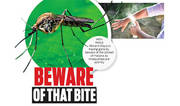
BEWARE OF THAT BITE
Posted 02 May 2024 | Source: The New Indian Express
With World Malaria Day just having gone by, beware of the spread of malaria as mosquitoes are aplenty
IN India, malaria still poses a serious threat to public health despite considerable improvements in recent years. To save yourself and your loved ones against this preventable disease, it is essential to comprehend the risk factors and put preventive measures in place.
Recognising the spread of malaria
Plasmodium parasites are the cause of malaria, an infectious disease spread by mosquitoes. Via contaminated blood feeds, the Anopheles mosquito spreads the parasite to people. Because these mosquitoes breed in stagnant water bodies, malaria transmission is more common in locations with poor drainage especially during the monsoon season (June to September).
In India, who is most vulnerable to malaria?
Travellers: People travelling to or relocating to locations where malaria is endemic, especially those that are mountainous, forested, or tribal belts, are at high risk.
Individuals who live close to bodies of stagnant water: In periurban and rural regions, mosquitoes that thrive in puddles, ponds, or badlymaintained drainage systems constitute a serious menace.
People with impaired immune systems: Those with HIV/AIDS, chronic illnesses, pregnant women, and children under five are particularly vulnerable to severe malaria.
Communities without adequate preventative measures and sanitation.
Effective Ways to Stop Malaria
Bed nets treated with longlasting insecticides, or LLINS: The most effective way to prevent malaria is to sleep under insecticide treated LLINS. Make sure you have full coverage. Given that they are more susceptible to the illness, pregnant women and small children should especially use LLINS.
Repellents for insects: Carefully follow the directions on the package when applying repellents containing DEET (Diethyltoluamide), picaridin, or IR3535 to exposed skin and clothes. Especially during outdoor activities in the evenings and early mornings when mosquitoes are most active, repellents offer an extra layer of protection.
Minimise sites for mosquito breeding: Avoid water stagnation from the areas surrounding your house, making sure drainage systems are in working order, and controlling vegetation close to homes. By supporting neighbourhoodlevel programmes for trash management and drainage enhancement, mosquito breeding grounds can be greatly reduced.
Early diagnosis and treatment:
Seek emergency medical assistance if you have any of the following symptoms, especially after visiting a high-risk area: fever, chills, sweating, headache, muscle pains, or exhaustion. Complications and transmission can be avoided with early diagnosis and timely medical care. Effective therapy of malaria and stopping the disease's spread depend on early symptom recognition and medical consultation.
